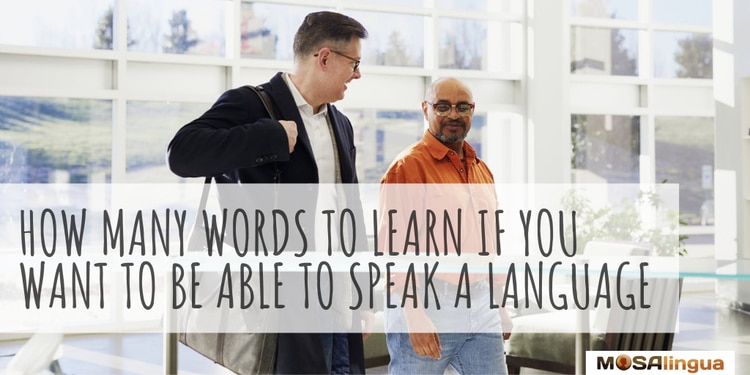Memorizing vocabulary is probably the most important task when learning a new language… But languages are made up of thousands of words. So you might be wondering how many words it takes to speak a language. In this article, we’re trying to answer the question.

Active Vocabulary vs. Passive Vocabulary
There are around 130,000 words in French. That’s a lot, right?! But don’t get discouraged! We have good news for you if you’re learning French or any other foreign language:
- Even native speakers don’t know all the words in their dictionary. A “typical person” knows about 70,000 words.
- Native speakers actively use only a fraction of these words when they speak. Usually somewhere between 10,000 and 15,000 words.
That said, it is important to understand the difference between “passive knowledge” and “active knowledge” of vocabulary. “Active” vocabulary is what we need to be able to speak and write a language.
So-called “passive” vocabulary is what we need to simply understand what we read or listen to. So, your “active” vocabulary may be much smaller than your “passive” vocabulary.
How to Count the Words You Need to Speak a Language
Beyond the difference between active and passive vocabulary, we need to take into account the way we count words when answering the question “how many words to speak a language.” For example, we say that “run,” “runs,” and “ran” can be considered as one word, because they are all forms of the same verb. On the contrary, “runner” is a noun, and should therefore be considered as a single word. Some linguists might not agree, but it’s hard to give an exact answer…
So, How Many Words Does It Take to Speak a Language?
Just between you and me, the number of words you need to be able to speak a language is not really the best question to ask… A better question is why you want to learn the language you’ve chosen. After all, each learner has different goals and according to these goals, the number of words to learn to speak a language can vary. So,
- 300 to 600 words may be enough if you want to go on a weekend sightseeing trip.
- However, if you want to reach a level where you can have a conversation, you’ll need to “actively” know between 1,000 and 3,000 words. With specific vocabulary, you’ll be able to handle various situations and daily conversations. You’ll understand and will also be understood when you travel. This is a level that satisfies most casual language learners’ needs.
- But it’s not enough to cover all the needs of someone who wants to work or study in a foreign country, for example. If you want to reach an advanced level, then you’ll probably need between 6,000 and 10,000 words.
- And if you want to speak as fluently as a native, you’ll need to learn 10,000 to 15,000 words.
As you can see, the end goal is very different when it comes to the number of words to know.
Quality Over Quantity!
The figures above should give you a general idea of the workload ahead of you. But here at MosaLingua, we’re more concerned with the quality of vocabulary than quantity. We believe that choosing specific words to learn is more important than sheer size of your active and passive vocabulary.
In the past, I made the mistake of trying to blindly learn a lot of words without prioritizing the most common and useful ones… But choosing the right words to learn is a game-changer. So, one piece of advice: focus on the words you need more than just how many words to speak a language.
Now you might be thinking, “Okay, but how can I choose the right words to learn?” You can start with something called frequency lists. These lists are based on the number of times a word appears in a specific situation. If you’re a beginner, I recommend that you first focus on frequency lists based on social interactions. These lists encourage you to prioritize verbs like “to go,” rather than “to sweep,” an irregular verb that you probably learned at school. (But which isn’t really that useful for a beginner.)
How Can I Be Sure I Won’t Forget the Words I Learn?
Once you have chosen the right words, the next challenge is not to forget them. Nothing is more effective for this than an SRS, or Spaced Repetition System. To summarize, it’s a very efficient method that reminds you to review a word just before you forget it. This way, you remember what you are learning more easily by always keeping it in the front of your mind. It’s perfect for long-term memorization.
With an SRS, words first go into your passive vocabulary and then, after a lot of repetition, end up in your active vocabulary. Of course, the best way to “activate the word” is to force yourself to use it in conversation.
If you want to save time and energy, we recommend that you get help from an app like MosaLingua. Our apps are based both on frequency lists and spaced repetition. There are more than 6,000 words and phrases in Mosalingua Premium (Web & Mobile). And you’ll be able to memorize up to 10,000 words because most flashcards include example sentences. Plus, with just 10 minutes of practice a day, you’ll be able to reach a level where you can have a conversation within 3 to 6 months. Try it out: MosaLingua Premium even comes with a free trial!
Learn more
3 Things to Remember!
To recap:
- The number of words to learn to speak a language really depends on your purpose. Remember that 300 to 600 words may be enough to travel, but at least 1,000 words are necessary for a conversation.
- The most important thing is not knowing how many words you need to speak a language, but which words to know. To begin, choose the most common words to maximize your progress and avoid wasting time.
- Finally, make sure you don’t forget what you’ve learned using smart methods like the SRS, which the MosaLingua app and lessons use, for example.
Video Recap – How Many Words to Speak a Language?
In this video, Luca returns to the question of “how many words to learn to speak a language,” and tries to help us understand the answer. This video was recorded in English, but subtitles are available in six languages. Turn them on by clicking on the gear in the bottom right corner of the video. Enjoy!
And don’t forget to subscribe to our YouTube channel for more videos from our team.
In the comments, share the number of words you know (check your MosaLingua stats) or want to know. Then, tell us about your favorite ways to learn vocabulary. See you again soon!
Related posts:
Start learning a new language today

Good news: we can help!
More good news: you can get started for free! Start your free trial now and for the next 15 days, take advantage of the most effective language learning method on the market!
Vocabulary flashcards, videos with subtitles, audiobooks, articles adapted to your level – with MosaLingua Premium (Web & Mobile), you’ll have access to all this and more. Get started right now. It’s free—and risk-free—to try!




Comments